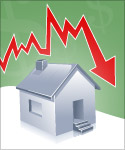
Even during the Great Depression some people made money. The same holds true today despite one of the toughest economic environments in decades. The key is to understand the roots of appreciation or what causes real estate to go up or down in value. Because all real estate is local, it is entirely possible to purchase a rapidly appreciating property even in a declining industry… in fact, often the property is able to appreciate because of the decline in the industry.
Today we will examine the major elements that cause real estate to appreciate or depreciate in value. Once you understand these simple concepts, it's possible to use each to create your own working checklist when searching for target acquisitions.
- The level of motivation for both buyers and sellers. Although the real estate market as a whole is suffering a decline, there is a substantial need for housing for both buyers and sellers. Many sellers need another place to live and buyers are eager to take advantage of a once in a lifetime buying opportunity.
- Government intervention — regulation, taxes and incentives. The United States has a long history of government intervention in relation to real estate… some for the better and some for the worst. From tax incentives to interest rates, the government is often able to exert tremendous influence on the real estate market. Keep a close eye on trends and position yourself to profit from those most likely to be implemented in the near future.
- The desirability of the neighborhood. Some neighborhoods are all but impossible to gain entry into even in the worst of times; few people leave and demand remains strong due to convenience, schools and other amenities. These are often the first to recuperate and the last to fall in price.
- Changes in infrastructure. New zoning, major building programs and other changes in infrastructure can dramatically increase or decrease the desirability of an area. Get to know the zoning department and make it a priority to purchase in the path of expansion.
- Inflation. Inflation is responsible for slowly eroding away the purchasing power of your hard earned dollars and savings accounts but it also tends to cause price appreciation in tangible asset classes which are not easily reproduced. The difficulty isn't in finding tangible assets in which to invest but rather trying to time when inflation will cause price appreciation. However, with low prices and even lower interest rates, it's not necessary to time the market in order to generate substantial profits; many properties that wouldn't cash flow a few years ago will do so very nicely today. Because your level of capital expenditure has changed, so does the corresponding profit potential and appreciation level.
This is one of the greatest times since the Great Depression to be investing in real estate. What's been holding you back?




